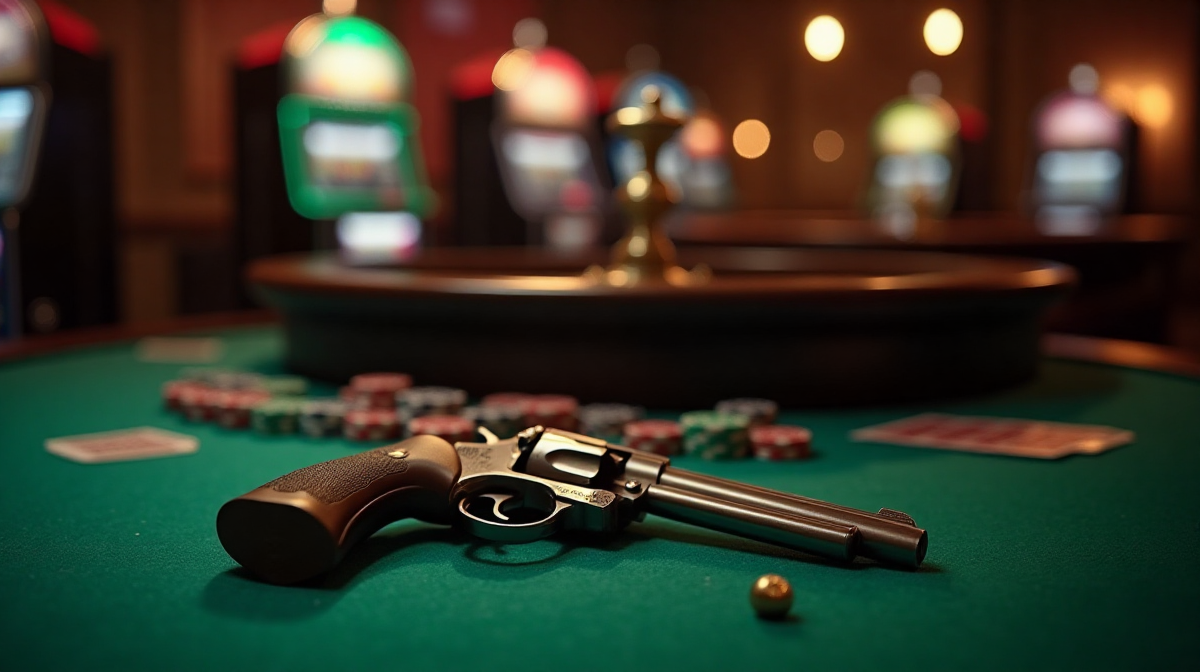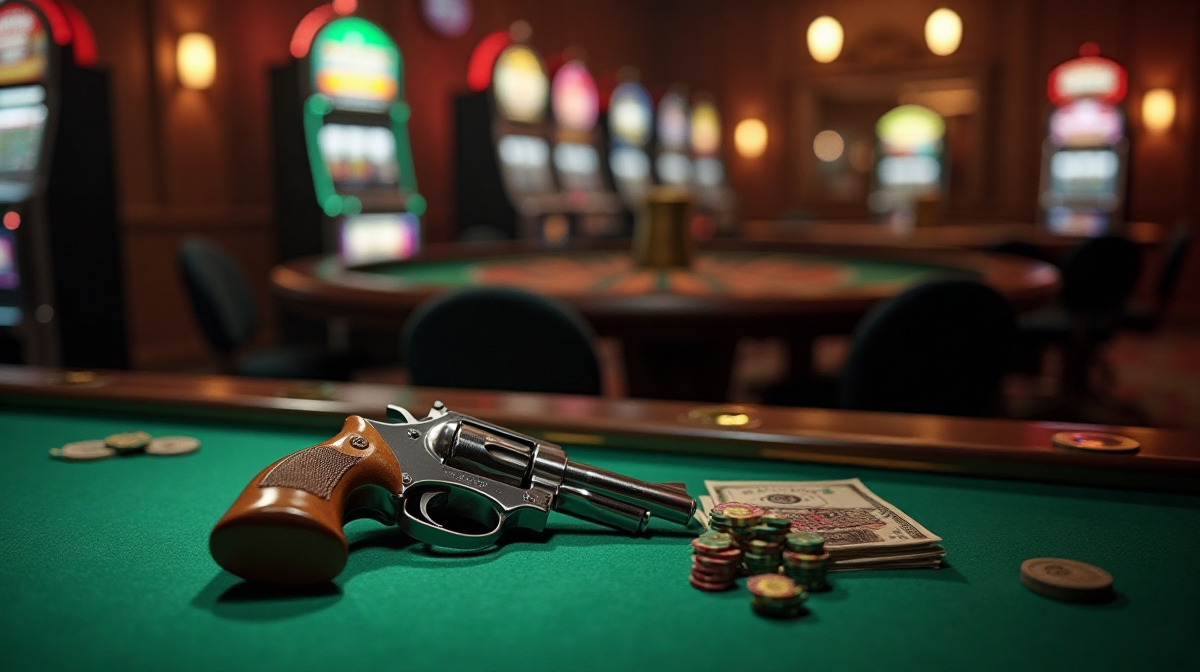Russian Roulette Meaning: History & Origins
Introduction: The Grim Fascination with Russian Roulette
Defining Russian Roulette: A Brief Overview
Russian roulette is a fatal game of chance, a dangerous and often misunderstood act involving a revolver loaded with a single bullet. The game involves spinning the cylinder, pointing the muzzle at one’s head, and pulling the trigger. The outcome, survival or death, is entirely determined by chance. While often depicted in popular culture, its historical origins are murky and debated. The thrill, if it can be called that, stems from confronting mortality and the illusion of control. For those seeking a different kind of thrill, carefully consider options like online gaming platforms where you can find a safer version of chance with the roulette game.
The Enduring Allure and Dangerous Symbolism
Despite its inherent danger, Russian roulette continues to hold a grim fascination. It has become a potent symbol of desperation, recklessness, and the ultimate gamble with life itself. The act represents a profound rejection of self-preservation, often linked to feelings of hopelessness or a desire to test one's fate. The symbolism extends to broader themes of risk-taking and the human fascination with the macabre. This fascination, however, should never translate into imitation. Looking for a safe and regulated gaming experience? Check out the latest star bet promo code for exciting offers.
Purpose of this Article: Exploring History, Origins & Meaning
This article delves into the complex history and origins of Russian roulette, separating fact from fiction. We will explore the historical claims, its spread through literature and media, the mechanics of the game, and its psychological and symbolic significance. Ultimately, we aim to deconstruct the myth and understand the reality behind this dangerous act, while also highlighting the importance of mental health awareness. We will also briefly touch on alternative forms of entertainment, such as platforms offering opportunities to star bet register for responsible gaming.

The Historical Roots: Tracing the Origins
The Early Accounts & Claims: 19th-Century Russia
The earliest documented accounts of Russian roulette originate from 19th-century Russia, though the veracity of these stories remains contested. The game is often linked to Russian officers and prisoners of war, but concrete evidence is scarce.
The Initial Stories of Russian Officers & Prisoners of War
The common narrative suggests that officers, facing imminent death or capture, would play the game to decide their fate. Prisoners of war, similarly desperate, are also said to have engaged in this deadly practice. These tales often involved high stakes and a desperate attempt to assert control in uncontrollable circumstances.
Debates about Verifiability and Historical Accuracy
Historians debate the reliability of these early accounts. Many are anecdotal, lacking corroborating evidence or originating from secondary sources. The lack of primary source documentation makes it difficult to determine whether Russian roulette was a widespread practice or a rare, sensationalized event.
Potential Origins in Gambling & Duels
The origins of Russian roulette may also lie in the gambling practices and duelling rituals prevalent in 19th-century Russia.
Common Gambling Practices of the Time
Gambling was widespread among the Russian aristocracy, and high-stakes games of chance were commonplace. The thrill of risk and the potential for significant gains were powerful motivators.
Comparison to Historical Duelling Rituals & Risks
Duelling, while governed by specific rules, was inherently dangerous. The risk of death was always present, and the act of facing one’s opponent required a certain level of fatalistic acceptance. Russian roulette could be seen as a twisted and solitary extension of these duelling practices.
The Role of the Caucasian War - A Primary Source?
The Caucasian War, a prolonged conflict between the Russian Empire and the peoples of the Caucasus, is frequently cited as a possible origin point for Russian roulette.
Examining Accounts Related to Fortress Sieges & Desperation
Accounts from this period describe desperate situations during fortress sieges, where soldiers facing certain defeat may have resorted to extreme measures. The confined spaces and limited options could have fostered a climate of recklessness.
Evaluating the plausibility of consistent use during this period.
While the conditions during the Caucasian War may have created a context where Russian roulette could have emerged, the lack of conclusive evidence makes it difficult to establish its consistent use during this period.
The Spread of the Legend: Popularization and Myth-Making
Russian Roulette in Literature and Early 20th-Century Accounts
The legend of Russian roulette gained traction through its depiction in literature and early 20th-century accounts.
Stories & Narratives Contributing to the Myth
Early fictional portrayals, while often exaggerated, helped to solidify the image of Russian roulette as a uniquely Russian act of desperation. These narratives contributed to the myth’s growing allure and notoriety.
The Impact of Literary Depictions on Public Perception
Literary depictions played a crucial role in shaping public perception of Russian roulette, transforming it from a potentially obscure practice into a widely recognized symbol of danger and recklessness.
The American Influence: World War II & POW Experiences
The American experience during World War II, particularly the stories of prisoners of war, significantly contributed to the popularization of Russian roulette.
Accounts from American Prisoners of War in Germany
American POWs held in German camps recounted witnessing or participating in games of Russian roulette. These accounts, widely disseminated after the war, fueled the myth's growth in the United States.
The Role of Psychological Warfare and Propaganda
Some historians suggest that accounts of Russian roulette among POWs may have been exaggerated or fabricated as part of psychological warfare or propaganda efforts.
Debates on the Authenticity of WWII-era Stories.
The authenticity of these WWII-era stories remains a subject of debate, with some researchers questioning the reliability of the accounts and the potential for embellishment or misinterpretation. If you prefer calculated risks, explore opportunities to star bet register and experience the excitement of online gaming responsibly.
Media Representation & the Reinforcement of the Myth
The depiction of Russian roulette in film and television further reinforced the myth and cemented its place in popular culture.
Film & Television Portrayals
Films like “The Deer Hunter” (1978) prominently featured scenes of Russian roulette, exposing the game to a wider audience and contributing to its sensationalization.
The Influence of Dramatic License & Sensationalism.
Media portrayals often prioritize dramatic effect over historical accuracy, leading to sensationalized depictions that perpetuate the myth and obscure the complexities of the game’s origins.
The Mechanics & Variations of Russian Roulette
Classic Russian Roulette: The Traditional Method Explained
The classic method involves a revolver, typically a six-chambered one, with a single bullet loaded into one of the chambers. The cylinder is spun, the gun is pointed at the player’s head, and the trigger is pulled. The outcome is entirely random, with a one-in-six chance of the bullet firing.
Variations & Modified Rules
Numerous variations of the game have emerged over time, each with its own unique set of rules and risks.
Different Caliber Weapons & Chamber Loadings
Some variations involve using different caliber weapons or loading multiple chambers with bullets, increasing the probability of a fatal outcome.
Spinning the Chamber – Examining the technique.
The method of “spinning the chamber” can also vary. Some players spin the cylinder after each pull of the trigger, while others only spin it once at the beginning of the game.
The Mathematical Probability of Survival
The probability of survival in Russian roulette is directly related to the number of chambers in the revolver and the number of bullets loaded.
Calculation based on revolver capacity & loaded chambers.
With a six-chamber revolver and one bullet, the probability of survival is 5/6 (approximately 83.3%), while the probability of death is 1/6 (approximately 16.7%).
Factors affecting probability outside the game
Factors such as the condition of the weapon, the quality of the ammunition, and the skill of the player can also influence the outcome, albeit to a lesser extent. For a predictable outcome, and a safer experience, consider the star bet promo code for engaging online games.

Psychological & Symbolic Significance
Russian Roulette as a Metaphor for Risk & Fate
Russian roulette serves as a powerful metaphor for the inherent risks and uncertainties of life.
Acceptance of Inevitability & Pursuit of Thrills.
The act can be interpreted as a morbid acceptance of inevitability and a desperate pursuit of thrills in the face of mortality.
The Appeal to a Sense of Control in a Chaotic World.
Paradoxically, some individuals may be drawn to Russian roulette as a way to exert control over their fate, even if that control is illusory.
Themes of Desperation, Hopelessness and Self-Destruction
Russian roulette is often associated with themes of desperation, hopelessness, and self-destruction.
Why people might be drawn to such a dangerous act.
Individuals contemplating Russian roulette may be struggling with profound emotional pain, feelings of worthlessness, or a desire to escape unbearable circumstances.
Connecting the act to mental health & crisis situations.
The act is frequently linked to mental health crises, suicidal ideation, and a lack of access to appropriate support. It’s important to remember that help is available.
Cultural Representations & the Romanticization of Danger
The romanticization of danger in popular culture can contribute to the allure of Russian roulette.
Russian Roulette Today: Legacy & Warnings
The Persistence of the Legend in Modern Culture.
Despite its inherent dangers, the legend of Russian roulette continues to persist in modern culture, appearing in literature, film, and music.
Copycat Incidents & the Potential for Suicide Contagion
The media portrayal of Russian roulette can potentially lead to copycat incidents and contribute to suicide contagion, particularly among vulnerable individuals.
The Dangers of Glorifying Self-Harm and Risky Behavior
Glorifying self-harm and risky behavior can have devastating consequences, normalizing dangerous acts and discouraging individuals from seeking help. Don’t gamble with your life – seek help if you are struggling.
Resources for Mental Health Support & Help
If you or someone you know is struggling with suicidal thoughts or mental health issues, please reach out for help. Numerous resources are available, including the National Suicide Prevention Lifeline and the Crisis Text Line.
Conclusion: Deconstructing the Myth & Understanding the Reality
Recap of the Historical Uncertainties & the Evolution of the Legend.
The origins of Russian roulette remain shrouded in uncertainty, with historical accounts often lacking corroborating evidence. The legend has evolved over time, shaped by literature, media, and cultural perceptions. Understanding the russian roulette meaning requires acknowledging the complexities and ambiguities surrounding its history.
The Importance of Responsible Media Consumption and Discussion.
Responsible media consumption and open discussion are crucial for deconstructing the myth and challenging the romanticization of danger.
Final Thoughts on the Dangerous Allure and Lasting Impact of Russian Roulette.
Russian roulette is a dangerous and tragic act with a lasting impact on individuals and society. It serves as a stark reminder of the fragility of life and the importance of mental health awareness. Rather than embracing risky behaviors, consider exploring safer forms of entertainment, and remember that a responsible approach to chance can be found with options like a star bet account.

